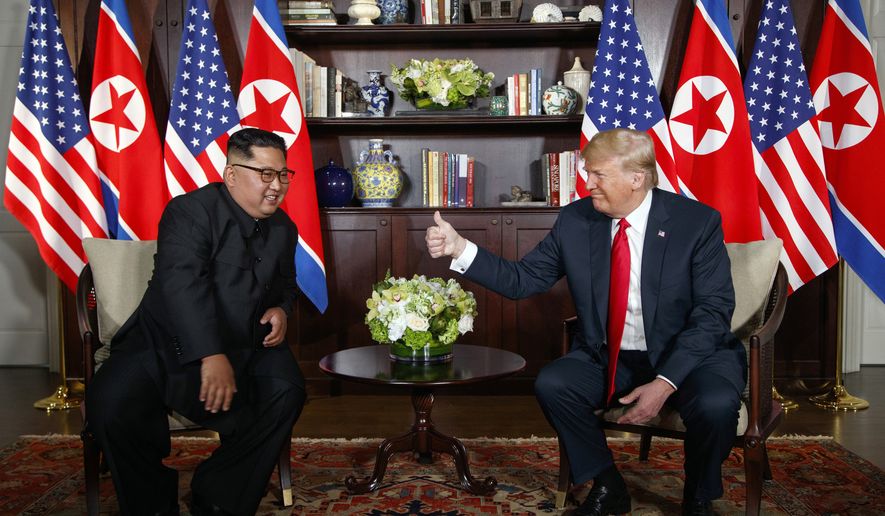OPINION:
The Democratic Party’s line on North Korea is just one of many strange inversions of the Trump era. Alongside its newfound ardor for free trade, embrace of Victorian sexual ethics, and suspicion of all things Russian, the Democrats are now the party of North Korean hawkishness.
When President Trump returned from the Singapore summit in June, having inked a declaration laying out North Korean dictator Kim Jong-un’s pledge to denuclearize his country, House Minority Leader Nancy Pelosi was scathing: “The president handed Kim Jong-un concessions in exchange for vague promises that do not approach a clear and comprehensive pathway to denuclearization and non-proliferation,” she said. So too was Senate Minority Leader Charles E. Schumer, noting that the communique offered “no details about how the United States might verify that North Korea has disarmed when they repeatedly lied in the past.”
In the ensuing months, ballast has been added to Mrs. Pelosi and Mr. Schumer’s positions. A steady stream of leaks from the intelligence community to reporters such as David Sanger at The New York Times has undermined the president’s overheated claim that the threat from North Korea is ended. (And by the way, the fact that the unremittingly brutal North Korean government remains an existential threat to its own people hasn’t changed a whit.) Mr. Sanger reported just last month that Pyongyang is continuing to develop its missile programs at 16 secret locations across the country. The sense in Washington is that the Singapore summit has come to nothing.
The left-wing South Korean government, which has been the driving force behind the detente — it was its representatives who hand-delivered that first letter from Mr. Kim to Mr. Trump that commenced their beautiful friendship — remains full speed ahead on the policy that it characterizes as “engagement,” however. South Korean President Moon Jae-in has met with the North Korean leader three times this year. On Mr. Moon’s recent, multiday visit to Pyongyang, the two spent a combined 16 hours together. While it is not clear what precisely they discussed, Mr. Moon returned to Seoul seemingly convinced that Mr. Kim is sincere in his pledge to denuclearize. Mr. Moon, whose slogan is “Peace First,” isn’t about to do an about-face.
The optimists in Korea, led by the Moon government, allow that progress has been slow. North Korea has not destroyed its nuclear facility at Yongbyon, for example, which it has promised to do. But they point to a couple of developments that suggest that the denuclearization and detente process remains on track. Most significantly, North Korea has not tested a missile or a nuclear weapon in more than a year. This, they argue, is technologically significant, because missiles and nukes require constant refinement.
Moreover, Jeffrey Lewis, a weapons expert at the Middlebury Institute tells me, “it presents a significant benefit in that, living with a nuclear armed North Korea, the arsenal is not as reliable as it might otherwise be. In the event of hostilities, Kim might — or should — have questions about whether his forces are sufficiently reliable to execute his nuclear war plan in the event of hostilities.” Without the benefits of constant testing, in other words, Mr. Kim is on shakier ground in the event of a conflict. (It’s worth noting that Mr. Lewis remains skeptical of the progress being made.)
The South Koreans also point to progress on the non-nuclear front. First, there’s the bonhomie between Mr. Moon and Mr. Kim, which is set to go into overdrive in the coming months when the North Korean dictator visits Seoul. North Korea has once again allowed reunions between families cleaved by the Korean War, the first such meetings in three years. And there have been moves made on both sides to demilitarize the hilariously misnamed Demilitarized Zone. Both North and South Korea have been removing guns, landmines and guard posts from the area, and in recent days, North and South Korean soldiers have even crossed the border to shake hands. This is unprecedented. Ultimately, one has to determine for himself whether these actions, coupled with the testing freeze, represent real and/or significant process.
It’s likely that Mr. Trump’s Democratic opponent in 2020 will run to his right on North Korea. One can expect a Kamala Harris or Cory Booker to torch the president of being “hoodwinked” by a brutal dictator. That means both the North and South Korean governments, committed to engagement, will probably be rooting for Mr. Trump. Should he be re-elected, could charges of “collusion” be far behind?
• Ethan Epstein is deputy opinion editor of The Washington Times. Contact him at eepstein@washingtontimes.com or on Twitter @ethanepstiiiine.




Please read our comment policy before commenting.